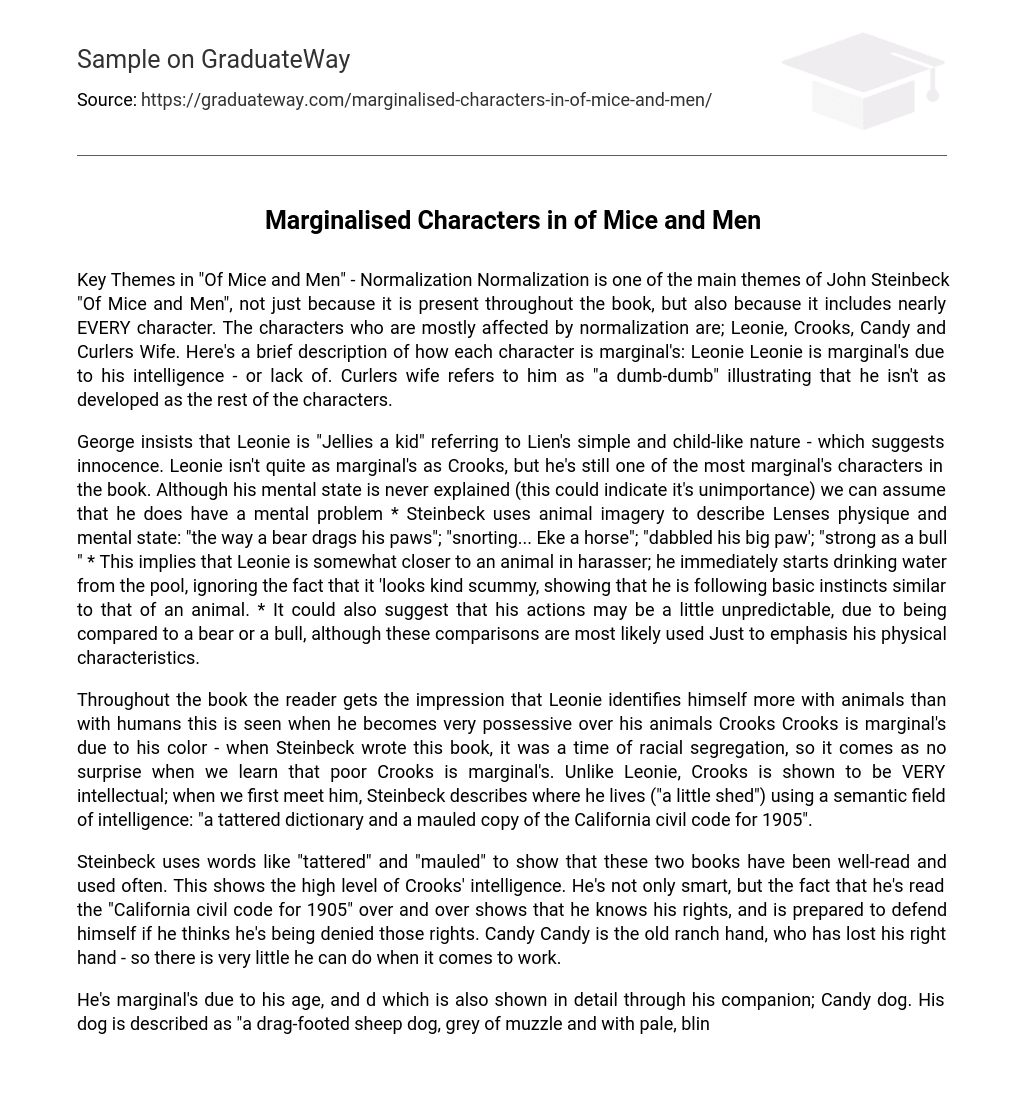Normalization is one of the main themes of John Steinbeck “Of Mice and Men”, not just because it is present throughout the book, but also because it includes nearly EVERY character. The characters who are mostly affected by normalization are; Leonie, Crooks, Candy and Curlers Wife. Here’s a brief description of how each character is marginal’s: Leonie Leonie is marginal’s due to his intelligence – or lack of. Curlers wife refers to him as “a dumb-dumb” illustrating that he isn’t as developed as the rest of the characters.
George insists that Leonie is “Jellies a kid” referring to Lien’s simple and child-like nature – which suggests innocence. Leonie isn’t quite as marginal’s as Crooks, but he’s still one of the most marginal’s characters in the book. Although his mental state is never explained (this could indicate it’s unimportance) we can assume that he does have a mental problem. Steinbeck uses animal imagery to describe Lenses physique and mental state: “the way a bear drags his paws”; “snorting… Eke a horse”; “dabbled his big paw’; “strong as a bull ” This implies that Leonie is somewhat closer to an animal in harasser; he immediately starts drinking water from the pool, ignoring the fact that it ‘looks kind scummy, showing that he is following basic instincts similar to that of an animal. It could also suggest that his actions may be a little unpredictable, due to being compared to a bear or a bull, although these comparisons are most likely used Just to emphasis his physical characteristics.
Throughout the book the reader gets the impression that Leonie identifies himself more with animals than with humans this is seen when he becomes very possessive over his animals Crooks Crooks is marginal’s due to his color – when Steinbeck wrote this book, it was a time of racial segregation, so it comes as no surprise when we learn that poor Crooks is marginal’s. Unlike Leonie, Crooks is shown to be VERY intellectual; when we first meet him, Steinbeck describes where he lives (“a little shed”) using a semantic field of intelligence: “a tattered dictionary and a mauled copy of the California civil code for 1905”.
Steinbeck uses words like “tattered” and “mauled” to show that these two books have been well-read and used often. This shows the high level of Crooks’ intelligence. He’s not only smart, but the fact that he’s read the “California civil code for 1905” over and over shows that he knows his rights, and is prepared to defend himself if he thinks he’s being denied those rights. Candy Candy is the old ranch hand, who has lost his right hand – so there is very little he can do when it comes to work.
He’s marginal’s due to his age, and d which is also shown in detail through his companion; Candy dog. His dog is described as “a drag-footed sheep dog, grey of muzzle and with pale, blind old eyes. This description of the dog mirrors Candy, as he too is old, and slow. This also suggests the depth of his relationship with his dog, as they have a lot in common Curlers Wife Curlers wife’s marginal’s status may be a little less obvious than everyone else’s, but she is marginal’s due to her gender.
Because she is a woman, she is looked down on by Curler and everyone else – this makes her awfully lonely, which is probably why she attempts to seduce the ranch hands. Despite being marginal’s, she has a certain amount of power over the other characters, such as Crooks; muff now what I can do to you if you open your trap? ” In this quote, Steinbeck is showing that Curlers wife threatens Crooks, who submits immediately.
Impeccable they are still implausible to help each other Steinbeck describes Crooks’ low status very early in the book through the “old swamped” Candy. Candy describes how Crooks gets abuse from the boss for things that are beyond his control. “An’ he give the stable buck hell too. ” aim see the stable bucks a Niger. ” The initial comments depict Crooks as an outsider as he is the only character described to have been getting abused by the boss. It also shows how Crooks is used as an outlet of the boss’s frustration.
This represents Crooks’ isolation further as Candy initial description of Crooks is through his color and not his personality or other features. The use of the racial term reflects also how society sees Crooks and that this type of language was acceptable to the people of these times. ***The use of the derogatory term ‘Niger’ instead of Crooks’ name shocks the reader but also gives us an insight into the level of segregation and abuse black people felt during the sas’s.
Unlike Leonie, Crooks is shown to be VERY intellectual; when we first meet him, Steinbeck describes where he lives (“a little shed”) using a semantic field of himself if he thinks he’s being denied those rights. As the reader, I don’t have to look far to acknowledge that Crooks is a marginal’s character, Just through the name Steinbeck has given the only black character in the book; the name “Crooks” communicates brokenness and incompleteness, this undoubtedly is the way Crooks feels about himself this has a catastrophic impact in the way Crooks deals and communicates with the other ranch workers,





